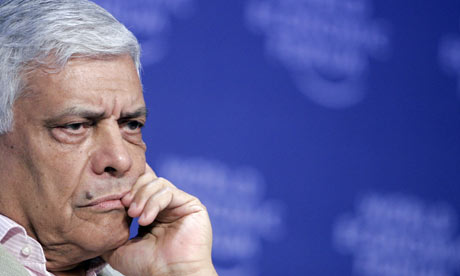Abdalla Salem El Badri: 'Opec will not hesitate to take some more quantities off the market.' Photograph: Virginia Mayo/AP Opec will not hesitate to cut its oil output further if prices fail to rise from current levels in the next month or two, the head of the oil producers' cartel said today. Speaking at the World Economic Forum in the Swiss town of Davos, the Opec secretary-general, Abdalla Salem El Badri, said the organisation's member countries needed a higher price if they were to have sufficient income to invest in developing secure supplies for the future. "We have to review the numbers and see how the market reacts. Opec will not hesitate to take some more quantities off the market," Badri said. His comments came as Shell posted its biggest drop in quarterly profits in a decade because of the slumping oil price, although it still set a new UK record for annual corporate profits of $31.4bn (£22.3bn) for 2008. Badri pointed to the record 2.2m barrels-per-day production cut Opec had agreed in December, on top of 2m of cuts in the previous few months. Opec pumps about one third of daily global oil production. Opec will hold its next meeting on 15 March and will review the impact of its big output cuts, which Badri said were being implemented 100% by member countries. Oil prices were hovering at about $42 a barrel this morning, having been hammered earlier in the week by gloomy economic news from the United States, the world's biggest energy consumer. Saudi Arabia, the world's biggest producer, said recently it wanted to see a price of $75 a barrel if it were to invest sufficiently to raise production in the future. Badri said that even if oil prices rose to $50 as a result of the cartel's output cut, it would not be sufficient to provide a fair price for Opec members. "Even with $50, we cannot have a decent income for our members," Badri said. "We need a fair price and fair income to allow us to invest in new capacity." He said a lot of investment would be required with overall world energy demand expected to rise 50% by 2030. He would not be drawn on whether he thought the current price level would mark a low point. He blamed "speculators" for having driven up oil prices to nearly $150 a barrel last summer and called for better regulation of speculative activity "because it damages the market and the demand". The BP chief executive, Tony Hayward, said he thought a price range for oil of $60 to $80 a barrel was "appropriate" if oil producing countries and companies were to have sufficient funds to invest in meeting rising demand for oil. He said $20 trillion needed to be invested over the next 20 years to meet the rising demand for oil and said the $60 to $80-a-barrel range would be sufficient to finance that investment. He said oil prices needed to go above $100 a barrel before consumers began to change their behaviour.Opec warns of further oil output cuts
Oil producers' cartel tells World Economic Forum its members need a higher price if they are to have sufficient income to invest

Thursday, 29 January 2009
Posted by
Britannia Radio
at
23:09
![]()





















